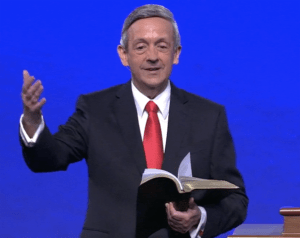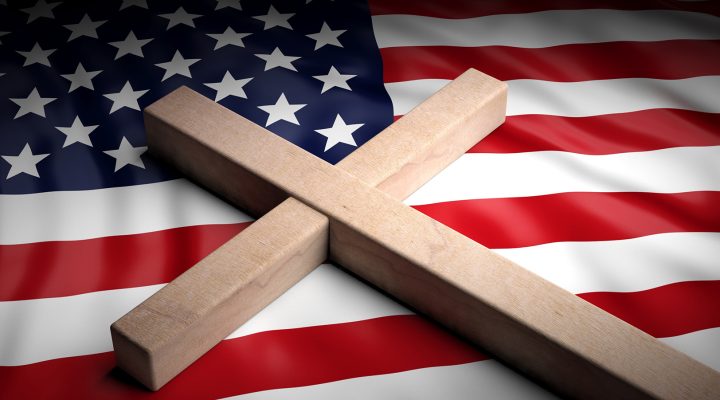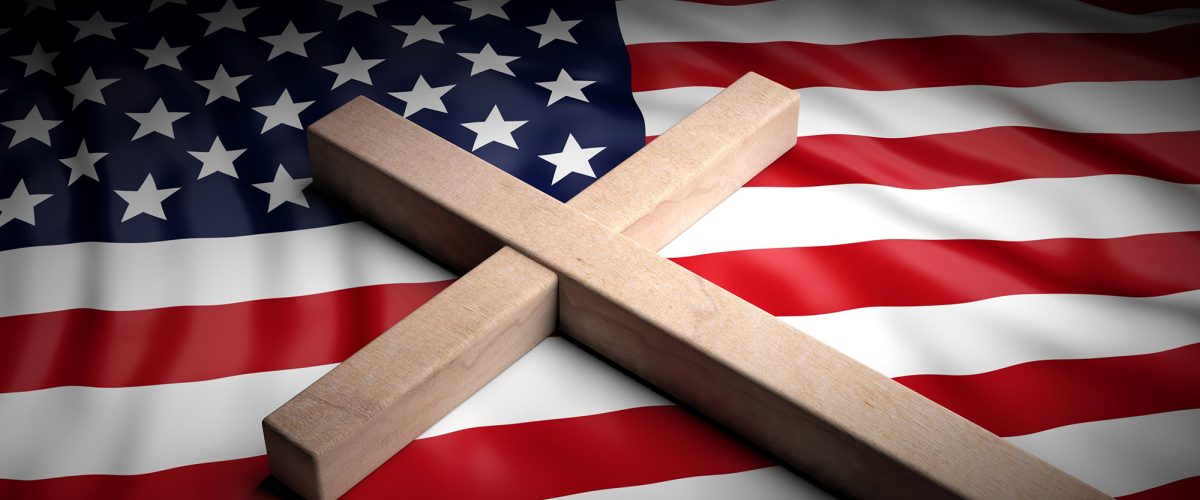America was founded as a “Christian nation” but that has been subverted since 1947 when “we allowed the liberals, the left, the progressives, the humanists, the atheists to pervert our Constitution into something the founders never intended it to be,” Robert Jeffress told his Dallas congregation July 3.
However, later in the sermon, the outspoken pastor of First Baptist Church of Dallas denied he is a “Christian nationalist” as critics have labeled his beliefs.

Robert Jeffress
“I often get accused of being a Christian nationalist,” he said. “I’m having reporters ask me all the time. This is a new phrase, ‘Christian nationalism.’ Are you a Christian nationalist? Do you believe America is exceptional to any other nation and is God’s preferred nation? And I answer with a resounding, ‘No, not in any sense.’ If you know anything about the God of the Bible, you know God is no respecter of people or nations.
“Yes, God has uniquely blessed the United States,” he continued. “He’s given us so much. You can see his hand in the founding of our country. But in the final analysis, God is no respecter of people or nations. Any nation that reverences God will be blessed by God, and any nation including the United States that rejects God will be rejected by God.”
The nation’s founders, however, intended to honor God in ways modern Americans have rejected, Jeffress said.
In a 40-minute sermon that was part history lesson and part review of a litany of U.S. court rulings, Jeffress traced his version of America’s origins and claimed the clear intent of the founders was to prefer Christianity over all other religions.
In fact, he said, the very phrase “wall of separation between church and state” was intended only to prevent government from favoring one Christian religion over another, not to give equal footing to all religions.
“We’re told the founders wanted to build this unscalable wall that would keep any spiritual influence from seeping out of the church into the public life,” he said. “That version of American history belongs right up there with the story of George Washington and the cherry tree. It is a complete myth.”
“That version of American history belongs right up there with the story of George Washington and the cherry tree. It is a complete myth.”
Further, Jeffress charged, the concept of a wall of separation is not part of the Constitution or the Bill of Rights and therefore does not accurately reflect the intention of the founders.
“When these two court rulings came out two weeks ago about school vouchers in Maine and about Coach Kennedy and his right to pray publicly, I read the comment of Supreme Court Justice Sonia Sotomayor. I read the comment and I thought either she is extremely deceptive or extremely ignorant because what she said was these decisions are destroying the constitutional wall of separation between church and state. Constitutional?
“Did you know 69% of the American people believe that the phrase ‘separation of church and state’ is found in the Constitution? They are surprised when they learn that the phrase ‘separation of church and state’ is nowhere in the First Amendment. It doesn’t appear anywhere in the Constitution itself, so how did such an idea gain popularity in America?”
When Thomas Jefferson wrote to a group of Baptists in Danbury, Conn., in 1802 and used that phrase, it was because the Baptists were upset that the Congregational Church was getting more tax funding as an “established” church by the state of Connecticut, Jeffress asserted.
“So Thomas Jefferson on Jan. 1, 1802, wrote them a letter to calm them down and like any good politician he quoted from one of their own, a Baptist, the first prominent Baptist, Roger Williams, who first used that phrase ‘separation of church and state.’”
Jeffress then interpreted: “What you have to understand is whether it was the First Amendment saying there shall be no established church or Jefferson’s letter, when they talked about no established church they meant no Christian denomination should be elevated over another Christian denomination; they should all be on equal footing. That’s what they were talking about.”
“When they talked about no established church they meant no Christian denomination should be elevated over another Christian denomination; they should all be on equal footing. That’s what they were talking about.”
He added: “Never in his wildest imagination did Thomas Jefferson ever suspect that one day his letter would be used to prohibit prayer in the public schools or Bible reading or the nativity displays in the town square, using the name of Jesus in a commencement speech. That was never in his mind at all.”
By Jeffress’ account, things began to go awry in 1947, with the decision of the U.S. Supreme Court in Everson v. Board of Education, a landmark case that for the first time applied the no-establishment mandate of the First Amendment to states and not just to federal government.
“This is the first time the Supreme Court ever mentioned a wall of separation between church and state, the first time the phrase is ever found in a Supreme Court ruling, which makes you wonder if that doctrine is so foundational to our country why wasn’t it in any ruling until 1947,” Jeffress told his congregation.
And by his telling, that majority opinion written by Justice Hugo Black was motivated by Black’s previous involvement with the Ku Klux Klan and its anti-Catholic teachings. Black intended to erect a wall of separation between Protestant Christianity and Catholicism, Jeffress said, citing current Supreme Court Justice Clarence Thomas as a source of support for this belief.
“Clarence Thomas has said, ‘This doctrine born in bigotry should be buried forever.’ Justice Thomas gets it. Aren’t you glad we have justices like Clarence Thomas on the Supreme Court? He gets it. He understands it.”
Thomas also is the justice who two weeks ago suggested the court should revisit and overturn other Supreme Court precedent that granted a right to contraception, decriminalized same-sex relations, and legalized same-sex marriage.
Earlier in the sermon, Jeffress said: “We are living in historic times right now, and over the last several weeks we’ve seen the Supreme Court of the United States issue some monumental decisions not only affecting abortion and the sanctity of life but in the last two weeks there have been two specific rulings regarding religious liberty. And this is my carnal side speaking: I’ve loved seeing the liberals’ heads exploding literally over these rulings, just going crazy.”
The “liberals,” he said, charge that the Supreme Court is taking the nation backward. “Well, in a sense they’re right. They are taking us back to our founding fathers’ original intentions, especially when it comes to the relationship between faith and public life.”
Throughout the sermon, Jeffress read quotation after quotation from various founding fathers to support his belief that they intended the nation to be guided by Christian doctrines.
By the end of the sermon, the pastor used the rejection of these founding Christian principles to explain everything that bedevils the nation today.
By the end of the sermon, the pastor used the rejection of these founding Christian principles to explain everything that bedevils the nation today.
When the Supreme Court ruled that the Ten Commandments may not be displayed in public buildings, that was “idiocy,” Jeffress said. “The devastating consequence of trying to separate faith from the public life is being seen all around us right now. We are reaping what we have sown.
“When you see these mass shootings in Uvalde, when you see these mass shootings in Buffalo and other places, what’s going on here, that’s just the tip of the iceberg,” he preached. “Today over 10 million teenagers in the U.S. drink alcohol regularly; 20% engage in binge drinking; 2,800 children die each year as a result of gun violence; another 14,300 are injured; nearly 1 million babies were murdered in the womb last year; and one in four women in the U.S. will have aborted at least one of their children by age 45; and on and on and on it goes.
“Are these tragedies just a coincidence?” Jeffress asked. “Now just consider the warning that God gave to his own people Israel. In Hosea 46 he said my people are destroyed for lack of knowledge. Because you have rejected knowledge, I will also reject you from being my priest. Listen to this: since you have forgotten the law of your God, I will also forget your children.”
Jeffress ended the service with an every-head-bowed, every-eye-closed prayer in which he pleaded with sinners to repent and find salvation not in a Christian nation but in Jesus Christ.
“Nobody goes to heaven because of their nationality. Nobody goes to heaven because of their race or sexual orientation. Nobody goes to heaven because of their church membership,” he said. “We go to heaven based on our relationship to Jesus Christ. The only people who will be in heaven will be forgiven people. On this Fourth of July weekend the most important question is not about America’s future, it’s about your future: Do you know when you die that you’re going to be welcomed into heaven? The only way to know that for sure is to make sure you’ve received the forgiveness that Christ came to offer.”
After leading the traditional Sinner’s Prayer for repentance, Jeffress left the stage and the congregation and choir ended the service by singing “God Bless America.”
Related articles:
Robert Jeffress says schools should fight gun violence by teaching the Ten Commandments
No, Pastor Jeffress (and others), America is not a Christian nation. And here’s why it matters | Opinion by Andrew Daugherty


